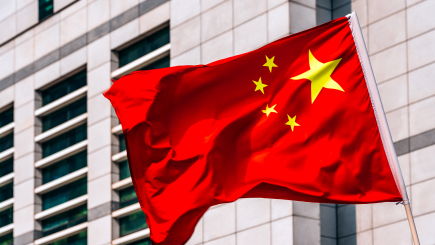
Learn about Communist China with online courses and programs
Explore the history of China to better understand how its political structure has evolved. Learn about this country with online courses delivered through edX.

What is Communist China?
“Communist China” refers to the People's Republic of China (PRC), a country in East Asia governed by the Chinese Communist Party (CCP). It was established in 1949, following a civil war, with the CCP at the helm. The term “Communist China” signifies a political and economic system guided by communist principles, where the government controls key industries, and there's a single-party rule. Under the CCP's leadership, China has undergone significant economic reforms while maintaining strict political control. Notably, China's modern socio-economic landscape is a blend of communist principles and market-oriented policies, making it a unique and evolving example of state-led socialism. The PRC is the world's most populous country and one of its largest economies, with a global influence that extends beyond its political and economic system.1
Browse online Communist China courses
Related Topics
Communist China course curriculum
Courses about China can cover a variety of subjects, focusing on different aspects of its history, politics, culture, and society. Topics that you may encounter include:
- Modern Chinese history: Review China’s history from the late 19th century to the present day, including the rise of the CCP, the founding of the People’s Republic of China, and key events like the Cultural Revolution and economic reforms.
- Chinese politics and government: Delve into the political system of China, focusing on the structure of the CCP, its policies, and the dynamics of governance in contemporary China.
- Chinese culture and society: Explore the cultural and society of China, spotlighting philosophy, art, literature, religion, and social structures.
- Chinese economic development: Cover the economic reforms initiated by Deng Xiaoping, the growth of China’s economy, and its impact on both domestic and global markets.
edX offers online courses that allow learners to study a variety of topics. Sign up for an accelerated boot camp, or enroll in a full degree program and start working toward a bachelor’s degree, or (for more advanced learners) a master’s degree in a relevant subject. You can also explore executive education programs specifically designed for busy professionals.
Why learn about Communist China?
Understanding the cultural nuances, politics, and history of China can be beneficial in a number of professional roles, such as:
- Diplomat or foreign service officer: Represents their country’s interests in China or in international organizations in which China plays a significant role.
- Academic researcher or teacher: Contributes to the field of Chinese studies by conducting research, publishing papers, and teaching students about China’s history, politics, or culture.
- International business consultant: Helps companies navigate the Chinese market and establish successful operations there.
- Journalist or correspondent: Covers events in China or reports on international relations for news agencies, newspapers, or broadcast media outlets.
- Nonprofit or NGO professional: Works on issues related to China, such as human rights, environmental conservation, or public health, in roles related to advocacy, research, or program management.
Are you interested in pursuing a career in any of these roles? Start building the knowledge you need with online courses offered through edX.
More opportunities for you to learn
We've added 500+ learning opportunities to create one of the world's most comprehensive free-to-degree online learning platforms.
China. (2023). Britannica. Retrieved on October 18, 2023.